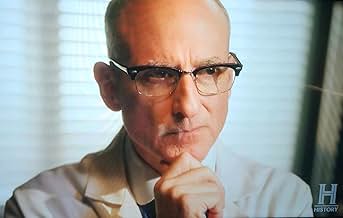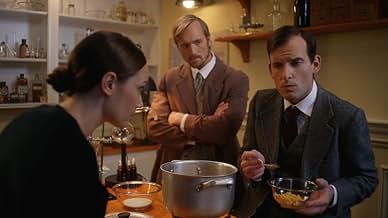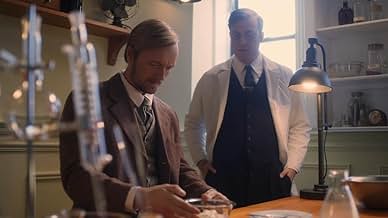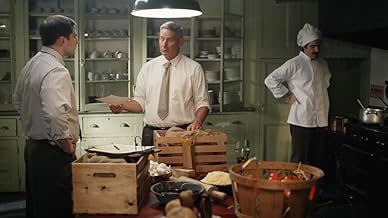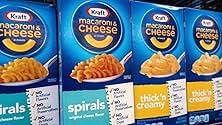CALIFICACIÓN DE IMDb
8.4/10
1.8 k
TU CALIFICACIÓN
La comida contará las historias desconocidas de innovación y rivalidades detrás de los magnates de la industria alimentaria Milton Hershey, John y Will Kellogg, Henry Heinz, C.W. Post, los h... Leer todoLa comida contará las historias desconocidas de innovación y rivalidades detrás de los magnates de la industria alimentaria Milton Hershey, John y Will Kellogg, Henry Heinz, C.W. Post, los hermanos McDonald y más.La comida contará las historias desconocidas de innovación y rivalidades detrás de los magnates de la industria alimentaria Milton Hershey, John y Will Kellogg, Henry Heinz, C.W. Post, los hermanos McDonald y más.
- Premios
- 1 nominación en total
Explorar episodios
Opiniones destacadas
Everyone and all of us love and enjoy food and with this new "History Channel" series called "The Food that Built America" it's very historical and informative as it tells how many of our favorites snacks were developed plus it tells the background and start of many famous tycoons. Spotlighted are fast food giants like McDonald's, Wendy's and Burger King. And the soda giants like Pepsi and Coke are featured. And interesting is seeing history and coming about of snack kings Hershey, Kellogg, Post, and Lays. Overall if you like history and want to know the pop culture of products and like to eat then watch this series it will fill you up just right!
The narrator of this very entertaining story is Campbell Scott, he is one if not the best at telling stories, love all the background stories on the major characters, a well deserved 10
Just right. Adding dramatisation to the storytelling of great American food brands... really works. The Food that Built America may not be one of the best documentaries ever made - but it is certainly is one of the more entertaining.
Suitability Schneider, Grim and Withe deliver a "fast food" approach to the documentary format - you keep wanting to come back for more. It's interesting, easy viewing and entertaining.
Adding to merit; it is, arguably, appealing to those who normally avoid documentaries and so manages to spread knowledge to a broader audience.
Well done.
Suitability Schneider, Grim and Withe deliver a "fast food" approach to the documentary format - you keep wanting to come back for more. It's interesting, easy viewing and entertaining.
Adding to merit; it is, arguably, appealing to those who normally avoid documentaries and so manages to spread knowledge to a broader audience.
Well done.
I started watching it when I got covid in mid June 2021 and immediately like it. It talks about all of the foods that Americans grew up with from Hersheys, KFC, Lays. Among many many others. It gives people a good insight about the foods they grew up eating as a kid. It's in a great format that keeps the viewer interested to learn about the investors of the foods and why the food was made and the time period and the conflict between the rival of the company. It makes you feel that you're in the time period that there mentioning. Great job history channel keep of the good work can't wait to see new episodes.
Kudos to History Channel for a riveting and well-made documentary about visionaries with ambition, drive, a thirst for success, and a willingness to risk everything on an untested, untried idea for a food that no one had experienced before.
This three-part six-plus-hour documentary follows the failure and success of several now-household product names from entrepreneurs Henry Heinz, Will and John Kellogg, Frank and Forrest Mars, Charlie Post and his ambitious daughter Marjorie, Milton Hershey, Harland Sanders, Clarence Birdseye, the two McDonald brothers, and the nearly-forgotten John Pemberton and his invention, Coca-Cola. Their tales are set against the backdrop of a country that, in the space of less than a century, evolved from a largely agrarian culture to the leader of the free world.
Each story is told by well-cast and talented actors, and supported by interviews with food historians, history professors, and food writers. The dramatizations take us to earlier times when success was far from assured, and failure and bankruptcy a real possibility.
The sets are stunning. Some exterior shots were done on location. I did wonder whether many of the interior scenes were filmed at the actual locations where they first occurred. They're first rate.
The people interviewed (primarily corporate and culinary historians) add their own in-depth knowledge to each tale. Whether they're discussing Hershey, or the Kellogg brothers, or Sanders, or one of the other culinary pioneers, each stresses that while they're household names today, success was not assured. Indeed, several of these 'food pioneers' went bust -- some more than once -- only to claw their way back up. Two world wars and a great depression challenged them to the point of failure, while post-war booms presented untold opportunities.
The people chosen each invented a food (or developed new ways to prepare or sell food) that had never existed before. In each case, they had to convince a skeptical public to try something new and unique, which meant big risk and long hours. In the end, each succeeded, and most of them reaped both fame and fortune.
The tale of the Kellogg brothers is intimately intertwined with that of C.W. Post, and their shared history is riveting. The same can be said of the friendship, then rivalry, then all-out war between two candy titans -- Hershey's Chocolate and Mars, Inc.
The histories of these food tycoons are somewhat different, but they shared the same goal: to change the way America looked at food. It was their overwhelming drive to succeed, and their certainty that their idea was the one America was waiting for, that finally paid off. The Food That Built America is entertaining, instructive, and even inspiring.
This three-part six-plus-hour documentary follows the failure and success of several now-household product names from entrepreneurs Henry Heinz, Will and John Kellogg, Frank and Forrest Mars, Charlie Post and his ambitious daughter Marjorie, Milton Hershey, Harland Sanders, Clarence Birdseye, the two McDonald brothers, and the nearly-forgotten John Pemberton and his invention, Coca-Cola. Their tales are set against the backdrop of a country that, in the space of less than a century, evolved from a largely agrarian culture to the leader of the free world.
Each story is told by well-cast and talented actors, and supported by interviews with food historians, history professors, and food writers. The dramatizations take us to earlier times when success was far from assured, and failure and bankruptcy a real possibility.
The sets are stunning. Some exterior shots were done on location. I did wonder whether many of the interior scenes were filmed at the actual locations where they first occurred. They're first rate.
The people interviewed (primarily corporate and culinary historians) add their own in-depth knowledge to each tale. Whether they're discussing Hershey, or the Kellogg brothers, or Sanders, or one of the other culinary pioneers, each stresses that while they're household names today, success was not assured. Indeed, several of these 'food pioneers' went bust -- some more than once -- only to claw their way back up. Two world wars and a great depression challenged them to the point of failure, while post-war booms presented untold opportunities.
The people chosen each invented a food (or developed new ways to prepare or sell food) that had never existed before. In each case, they had to convince a skeptical public to try something new and unique, which meant big risk and long hours. In the end, each succeeded, and most of them reaped both fame and fortune.
The tale of the Kellogg brothers is intimately intertwined with that of C.W. Post, and their shared history is riveting. The same can be said of the friendship, then rivalry, then all-out war between two candy titans -- Hershey's Chocolate and Mars, Inc.
The histories of these food tycoons are somewhat different, but they shared the same goal: to change the way America looked at food. It was their overwhelming drive to succeed, and their certainty that their idea was the one America was waiting for, that finally paid off. The Food That Built America is entertaining, instructive, and even inspiring.
¿Sabías que…?
- ErroresReferring to the McDonald's franchise system, it's said they pay a percentage of the earnings as a fee. That is incorrect. They pay a percentage of the sales. Earnings are net profit after all expenses are deducted from sales.
Selecciones populares
Inicia sesión para calificar y agrega a la lista de videos para obtener recomendaciones personalizadas
- How many seasons does The Food That Built America have?Con tecnología de Alexa
Detalles
- Fecha de lanzamiento
- Sitio oficial
- También se conoce como
- The Food That Built the World
- Productoras
- Ver más créditos de la compañía en IMDbPro
- Tiempo de ejecución43 minutos
- Color
Contribuir a esta página
Sugiere una edición o agrega el contenido que falta

Principales brechas de datos
What is the Spanish language plot outline for The Food That Built America (2019)?
Responda


